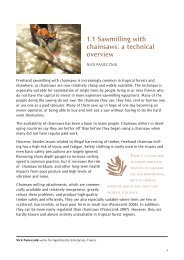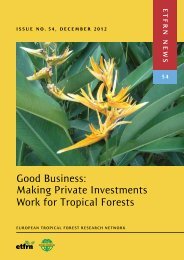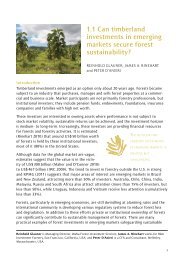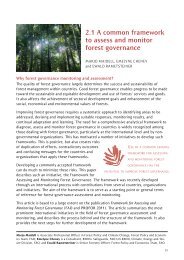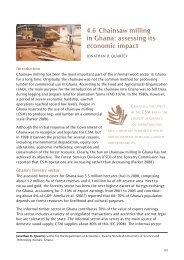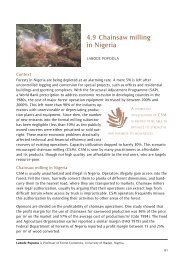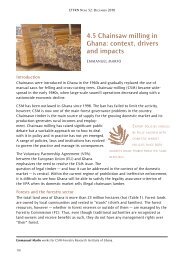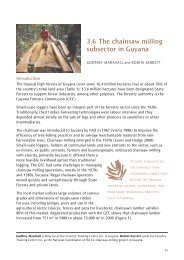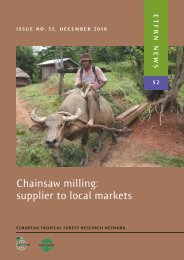Chainsaw milling: supplier to local markets - European Tropical ...
Chainsaw milling: supplier to local markets - European Tropical ...
Chainsaw milling: supplier to local markets - European Tropical ...
Create successful ePaper yourself
Turn your PDF publications into a flip-book with our unique Google optimized e-Paper software.
4.9 chaiNsaw milliNg iN NigERia<br />
according <strong>to</strong> the Fao (2004) three key fac<strong>to</strong>rs influence the ability of resource owners <strong>to</strong><br />
fully appropriate values and transform them <strong>to</strong> economic benefits:<br />
• resource characteristics;<br />
• ownership of resources, including policies and legislation that define ownership,<br />
the social and economic conditions of the owners and more importantly their<br />
entrepreneurial ability (including the ability <strong>to</strong> understand changing opportunities<br />
and <strong>to</strong> move up the value chain); and<br />
• the nature of <strong>markets</strong> served.<br />
These fac<strong>to</strong>rs interact with each other, altering the ability <strong>to</strong> capture the different values<br />
derived from chainsaw <strong>milling</strong>.<br />
unfortunately, stakeholders in the forestry sec<strong>to</strong>r display less and less interest in<br />
understanding the intricacies of its management. This is compounded by the commonproperty<br />
characteristic of most natural forests where Csm usually takes place. in such<br />
circumstance, pricing is inappropriate, and efficiency and transparency in resource<br />
extraction are not guaranteed. Csm is largely a private enterprise made up of individual<br />
owners with varied interests. in this situation, standards are not assured; nor do ethics<br />
and professionalism come in<strong>to</strong> play. maximum profit is<br />
the common aim. in recent times, however, some of the<br />
opera<strong>to</strong>rs have organized themselves in<strong>to</strong> cooperatives or<br />
associations, with the common goal of resisting the formal<br />
sec<strong>to</strong>r’s effort <strong>to</strong> get government <strong>to</strong> outlaw Csm.<br />
Markets<br />
The market is a key determinant in any enterprise. before the<br />
1980s, lumber from chainsaw operations was found mainly in<br />
rural and peri-urban <strong>markets</strong>. The market consisted mainly<br />
of people who required wood for rough construction work.<br />
with the economic downturn of the mid-1980s, however,<br />
Csm lumber began <strong>to</strong> appear in urban <strong>markets</strong>, partly<br />
because it was cheaper than mill-sawn wood. a drop in personal incomes encouraged<br />
buyers <strong>to</strong> settle for cheaper sawnwood from Csm, thus creating a huge market for it. a<br />
survey by popoola (2006) of selected <strong>markets</strong> showed significant disparities in prices of<br />
chainsawn and mill-sawn planks in nigeria, ranging from us$0.16–3.6 per m 3 . by 2009 the<br />
difference ranged from us$0.8–9.0 per m 3 . This becomes significant when large consignments<br />
are involved. The lower cost of chainsawn wood can defray the costs of labour and<br />
other materials. This is a major driving force in the continuing importance of Csm in the<br />
economy. another driver is the improvement in the quality of the output.<br />
policy response<br />
until recently Csm was outlawed in many states in nigeria. it continues <strong>to</strong> be practised,<br />
however, and more states are relaxing their legislation, for several reasons:<br />
• depleted timber resources, making investment in formal sawmills unattractive;<br />
• a huge capital requirement for the establishment of sawmills (band saw, trucks,<br />
185



